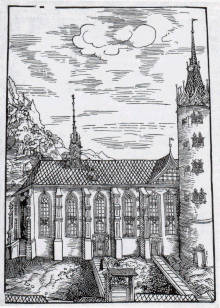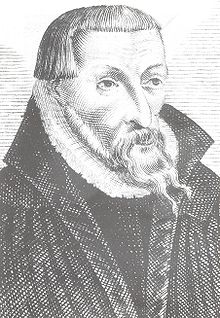Salomon Gesner
Salomon Gesner , sometimes also written Gessner or Geßner, (born November 8, 1559 in Bunzlau , Silesia , † February 7, 1605 in Wittenberg ) was a German Lutheran theologian of the Reformation .
Life
Origin and education
Gesner was the son of the subdeacon of Bunzlau Paul Gesner and his wife Anna geb. Cunrad. His father had been a student of Martin Luther in Wittenberg and had been ordained by the reformer Johannes Bugenhagen . Eleonora Maria Jauch (1722–1802), daughter of Bardowick canon Johann Christian Jauch (1702–1788) and ancestor of the Jauch-Overbeck family, is one of his descendants .
Gesner was orphaned in 1565. He was a kurrende pupil in Troppau and later in Bunzlau. He then attended the Elisabethan in Breslau . He broke off an apprenticeship as a goldsmith. In 1576 he was given a post at the Wilhelmskollegium in Strasbourg for five years . There he also heard the astronomer and musical theorist David Wolckenstein . In 1581 he became a baccalaureus, in 1583 master's degree in philosophy at the University of Strasbourg.
Theological work

He found his first job as an educator in the house of the Hungarian humanist Andreas Dudith in Breslau. In 1585 he became principal of the school in Bunzlau, which he brought to a new bloom. In 1589 he was appointed rector of the education department in Stettin . In 1591 he began quarreling with the local Melanchthonians as a representative of the concord formula . In 1592 he moved to Stralsund and worked there as a professor at the Sundisches Gymnasium and as an adjunct to the pastor. After he was appointed professor of theology at the University of Wittenberg in May 1593 , he received his doctorate in theology on August 20 under Polycarp Leyser the Elder and Samuel Huber . He was twice rector of the Wittenberg Academy. In 1595 he was also provost at the castle church in Wittenberg . At the same time he was a visitor to the Wittenberg consortium district .
His lectures at the university mainly dealt with the Old Testament , the Psalms and the prophets. He also published some writings in this area. As a representative of Lutheran Orthodoxy , Gesner primarily fought Calvinism and the associated cryptocalvinism . Samuel Huber and Martin Moller , among others, were involved in his disputes . He died of a hemorrhage “as a result of excessive exertion at a sermon” and commented: “Wolan, it is better to preach too dead than to celebrate or to feast too dead.”
meaning
Gesner's theological works are less innovative, “they stand in the Lutheran tradition and are for the most part ideologically tinged pamphlets against the Melanchtonians and the Reformed Church. G. is significant in church history because of his combative attitude. The dissatisfaction in the Protestant denomination in the Reformation era shows itself very significantly in his person. ”(Oliver Tekolf in the BBKL ) In the theological disputes among Protestants in the course of the Reformed confessionalization (also known as the“ Second Reformation ”) and Lutheran confessionalization, the after death Luther between the crypto Calvinists calculated Philippists one hand and the representatives of Concord showed the other hand, he counted immovably to the Lutheran, and opposed vehemently Calvinismus . After the fall of the Philippists in Wittenberg and Saxony, he began the dispute with the Melanchthonians in Pomerania in 1591. His controversy resulted in his appointment as professor of theology in Wittenberg and court preacher at the traditional castle church, on the door of which Luther once posted his 95 theses . He did not disappoint the expectations placed on him: from Wittenberg he tracked the Calvinists and tried to suppress them, as was not least his pamphlet “Christian Warning for the Estates, Towns and Commoners in Silesia, which they guard for Calvinist and Sacramento Irish and want to provide ”from 1602.
Selection of works
- De psalmorum dignitate. Wittenberg 1593.
- Aegidius Hunnius , Salomon Gesner, and Polycarpus Leyser : Controversiae inter Theologos Wittenbergenses de Regeneratione et Electione Dilucida Explicatio. Frankfurt 1594. 4to.
- Meditationem generalem psalteri. Wittenberg 1597.
- Passio Christi. Wittenberg 1600.
- De Conciliis libri quattuor. Wittenberg 1600.
- Faithful Christian warning to the estates, towns and commons in Silesia that they want to take care of Calvin and Sacramento Iraq. Wittenberg 1601.
- Thorough refutation of the Calvinian Apologiae Martini Molleri , the most distinguished preacher in Görlitz. Wittenberg 1602.
- Compendium doctrina coelestis. 1606 (posthumously).
- Commentarius in David's psalmos. 1606 (posthumously).
literature
- Ulrich Wiedenroth: Krypsis and Kenosis. Studies on the topic and genesis of Tübingen Christology in the 17th century , contributions to historical theology 162, Tübingen 2011, ISBN 978-3-16-150873-8 , pp. 405-410.
- Elke Axmacher: Praxis Evangeliorum: Theology and Piety with Martin Moller (1547–1606) , Volume 43 of Researches on Church and Dogma History , ISBN 3-525-55150-9 , 1989
- Irene Dingel , Günther Wartenberg : The Theological Faculty Wittenberg 1502 to 1602 . Leipzig 2002, ISBN 3-374-02019-4
- Walter Friedensburg : History of the University of Wittenberg . 1917
- Heinz Kathe : The Wittenberg Philosophical Faculty 1502–1817 (= Central German Research. Volume 117). Böhlau, Cologne / Weimar / Vienna 2002, ISBN 3-412-04402-4 .
- Martin Moller : Short apologia of a number of teaching and consolation pieces: so by Dr. Salomon Gessner was attacked and suspected in the newly issued book Praxis evangeliorum . Goerlitz 1602
- Johann Schöpff: Most honest, hardworking statement of the Lucifer and supreme Prince of the Hellenes against his tough (but still eynfold) servant Salomon Geßnarrn, Wittenberg doctor, because of two and more from Teuffel himself ... written missiff: if he is in honor of his lord Lucifer ... Newly let it go quickly to print… 1605
- Isabel Sellheim : The family of the painter Friedrich Overbeck (1789–1869) in genealogical overviews (= German Family Archives, Volume 104). Neustadt an der Aisch 1989, ISBN 3-7686-5091-X , ISSN 0012-1266
- Hellmuth Heyden : Church history of Pomerania . Volume 2, p. 53, 2nd edition
- Johann Christoph Erdmann : Biography of all provosts at the castle and university church in Wittenberg . Wittenberg 1802
- Daniel Cramer : The great Pomrische Kirchen-Cronikon. Book 4, Stettin 1628, p. 35
- Christian Gottlieb Jöcher : General lexicon of scholars . Part 2, 1750, column 970
- Georg Mylius : A Christian funeral sermon / Bey of the rich people corpse enjoyment of the once venerable / and Hochgelarten Lord: Solomonis Gesneri, the Holy Scriptures Doctoris and Professoris zu Wittemberg. Wittenberg 1605 In: Fritz Roth : Complete evaluations of funeral sermons and personal documents for genealogical and cultural-historical purposes . Volume 7, R 6971 ( also online )
- Adolf Schimmelpfennig : Geßner, Salomon . In: Allgemeine Deutsche Biographie (ADB). Volume 9, Duncker & Humblot, Leipzig 1879, p. 121 f.
- Oliver Tekolf: Gesner, Solomon. In: Biographisch-Bibliographisches Kirchenlexikon (BBKL). Volume 27, Bautz, Nordhausen 2007, ISBN 978-3-88309-393-2 , Sp. 533-535.
- Gesnerus, Solomon. In: Johann Heinrich Zedler : Large complete universal lexicon of all sciences and arts . Volume 10, Leipzig 1735, column 1292 f.
- Johann Samuelersch , Johann Gottfried Gruber : General Encyclopedia of Sciences and Arts Part 64, p. 279
- Armin Kohnle, Beate Kusche: Book of Professors of the Theological Faculty of the University of Wittenberg 1502 to 1815/17. Evangelische Verlagsanstalt, Leipzig, 2016, ISBN 978-3-374-04302-6 , p. 61 ff.
Web links
- Publications by and about Salomon Gesner in VD 17 .
- Melchior Adam: Vitae Germanorum Theologorum qui superiori seculo Ecclesiam Christi… propagarunt… , Frankfurt a. M. and Heidelberg 1620
Individual evidence
- ↑ Evangelical Lutheran Church of Saxony, The Registratures of Church Visitations in the Former Sächsischen Kurkreise , 2009, ISBN 1-110-09003-X , p. 171
| personal data | |
|---|---|
| SURNAME | Gesner, Salomon |
| ALTERNATIVE NAMES | Gessner, Salomon; Geßner, Salomon |
| BRIEF DESCRIPTION | German Protestant clergyman |
| DATE OF BIRTH | November 8, 1559 |
| PLACE OF BIRTH | Bunzlau |
| DATE OF DEATH | February 7, 1605 |
| Place of death | Wittenberg |

